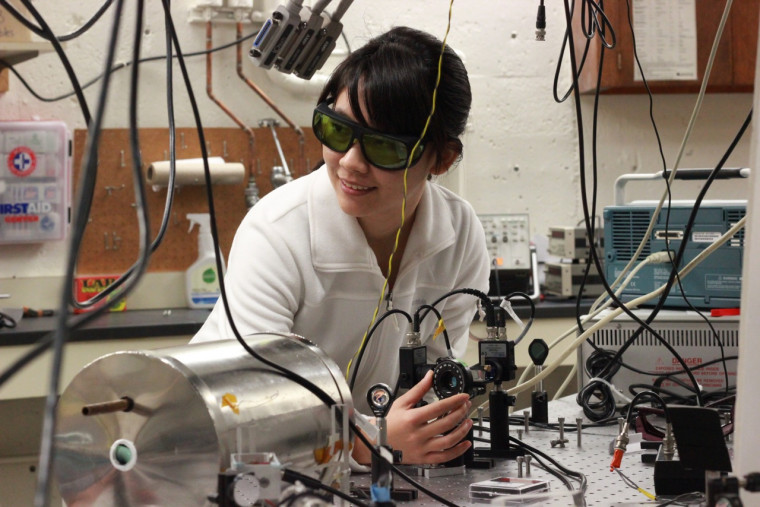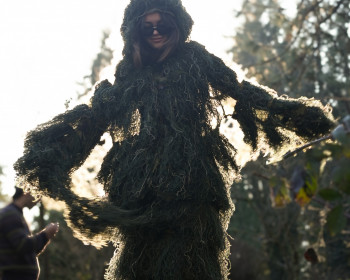Students expand the field of atomic optics with summer research
Open gallery

During the summer, Lewis & Clark students continue to work hard in their fields of study. By collaborating with faculty on research projects, students are able to engage their curiosity, expand their learning, and prepare for life after college, all while making meaningful contributions to scholarship.
Alaina Green BA ’13 and Aojie Zheng ’15 are working with Assistant Professor of Physics Shannon O’Leary to investigate how laser frequency noise can be used to make precise measurements of magnetic fields. In the following Q&A, Green and Zheng reflect on their experience.
What are you researching?
We are researching a method by which you can detect very small magnetic fields using the interaction between atoms and light. Such a method is called atomic magnetometry and there are several ways to go about it. The unique aspect of our research in particular is that we have studied how random fluctuations in the laser’s operation can be used to improve the precision of our measurement. In most labs that conduct atomic magnometry, laser frequency noise degrades precision, but in our case, it improves it.
Does your research have any potential applications in the real world?
Magnetic fields are produced by everything around us; Earth creates a magnetic field and so does the human body. Earth’s magnetic field is relatively easy to detect because it is large. Magnetic fields produced by the human body are about 10 million times smaller than that, making them difficult to measure. Improving our ability to measure the small magnetic fields produced by the human brain or heart could lead to the development of more advanced medical diagnostics.
How has working closely with faculty influenced your education?
Working with Shannon has motivated our studies by showing us that the things we learn in lectures and books can be applied to conducting research, and that our learning is no longer simply a review of things known, but an addition to the body of human knowledge. Shannon is very patient and allows us to find answers on our own so that we will understand it more deeply, even when she knew the answer from the start!
How will your experiences this summer impact your future studies or professional pursuits?
Green: Next year, I will continue conducting research in the field of atomic optics at a different laboratory at the University of Washington while I work toward my PhD in physics. Shannon has done so much to prepare me to be successful. This summer, I am doing my best to note everything she has taught me about improving as a researcher so I can share that knowledge with newer students in the lab.
Zheng: This is my first time studying quantum optics. In the future, I want to conduct scientific research as a career. Shannon has given me the opportunity to learn what that would be like, and the skills I need to do it.
About the program
The John S. Rogers Science Research Program allows students to participate in graduate-level research with an emphasis on strengthening their communication skills by requiring them to present their findings. This summer, 40 students are pursuing topics that range from artificial intelligence and motivating behavior to holographic tweezers and zebra fish. Working closely with peers and faculty members, students undertake research questions and present their work in two public venues.
“We’re not asking you, ‘What’s the answer?’ We’re saying, ‘What’s the question?’” said Michael Broide, director of the Rogers program and chair of the physics department. “I think what sets our program apart is that regardless of what project you are on, we’re all going to come together as a group to present what we’re doing in as accessible a way as possible. In science, it’s such an important skill to be able to explain cogently what you’re doing.”
Students make their final research presentation at the Rogers summer science poster session, held in conjunction with the Science Without Limits Symposium. Scheduled for September 18, the poster session is free and open to the public.
Department of Physics Rogers Summer Research Projects
Zibby Pillote ’14 contributed to this story.
More Newsroom Stories
Public Relations is located in McAfee on the Undergraduate Campus.
MSC: 19
email public@lclark.edu
voice 503-768-7970
Public Relations
Lewis & Clark
615 S. Palatine Hill Road MSC 19
Portland OR 97219

